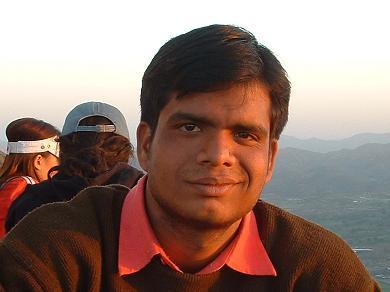Manish, a young man from Udaipur

My name is Manish, I'm 22 years old and I come from a little village near Udaipur. I'm a painter in a painting school in Udaipur and I paint miniatur paintings which are sold in the shop of my boss. We are 12 painting students and we learnt painting from our teacher who is the owner of the painting school. In the morning we are painting for about five hours and in the afternoon we try to sell the pictures. I like my work very much because it's not a physical work and I have a good salary. I earn -depending on the sold pictures- between 3000-5000 Rupies per month (70-110 Dollars).
For my parents life is not so easy. They are farmers and have a very hard physical work which doesn't bring them so much income. So I have to give my salary to my father and he buys my clothes and gives me some pocket money.
I belong to the second highest caste, the kshatriya caste. In our caste people get married between 20 and 22. In India we can't choose the partner -the weddings are arranged by the parents.
In half a year I'm going to marry and I'm very happy because I saw my bride-to-be two month ago on our engagement party -and she is very pretty and seems to be nice!
The wedding will last for three days and it's going to be a big party with all the relatives and a lot of friends. I'm locking forward to set up my own family very soon and I hope that my wife fits to me.
Manish ki Sing, Udaipur
I met Manish in Udaipur and made friends with him. He told me about his life and about a few peculiarities of the indian community.
The caste system
The caste system has its origin from 1500-1200 B.C. and it was implemented to organise and to structure the society. The castes, also called Vedras, are divided as follows:
1. Brahmin: priests, teachers
2. Khastriya: rulers, warriors
3. Vaishya: traders, manufacturers
4. Shudra: workers (have to work for the three upper casts)
Beside this four castes it exists additionally a fifth one.
Those people form the lowest stratum of the society are mostly very poor, have just few rights and work as road sweepers, toilet cleaners or the like. Because of their dirty work they are regarded as unclean and are not allowed to touch somebody else and are not touched by other castes. Those people are often called the "Untouchables" or the "Schedule Caste".
Every cast has its undergroups called Sadi whichs classification depends on the region and the work of the family. The affiliation
to a caste is given with the birth and can't be changed.
Even though the government has abolished the cast system a long time ago it's still active and omnipresent in the daily work and in the family. For example weddings are still just inside the caste and are normally arranged by the parents. Birthday and education of the two candidats are also part of the selection process to find the right partner.
Jobs are often assigned according to the caste. So if somebody belongs to a high caste he is lucky and can get a good job!
To reduce this injustice the government enacted a law which says that every caste, even the Schedule Caste, could get a government job. So it can happen that a university graduate can't get a government job because the job was given to a graduate of a lower caste. It's understandable that especially people from upper castes have problems with the new regulation. So the government trys to force the disappearance of the caste system. But it will take a lot of time because despite the abolishment of the system the one milliard community is still organised with it and people seem not want to change it so fast. In the cities it's changing now but especially in the countryside it will take very long time.
One reason for it might be that in the schools the caste system is not explained. By teaching it in the school the population could be sensitised about the proplems of the system.
But nobody would do that because in this case the cabinet would admit that the caste system still exists which the goverment abolished a few years ago.
Andy
23.02.04, Udaipur, India